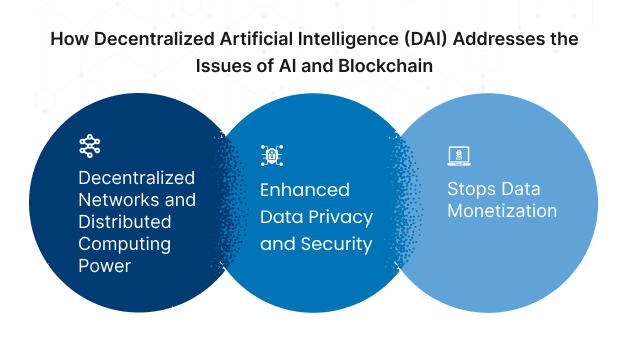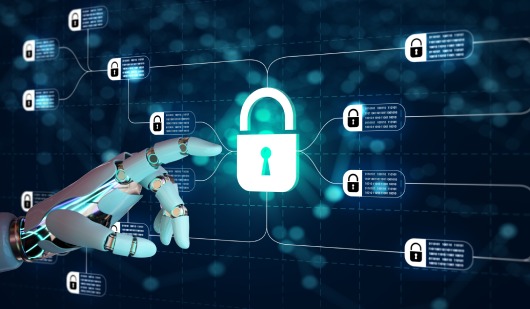-
Traditionally, Artificial intelligence (AI) models are centralized. However, it raises concerns regarding data privacy, limited accessibility, and opaque decision-making processes. Recent advancements in blockchain technology and cryptography have significantly accelerated the decentralization process. They have resulted in new technologies like decentralized artificial intelligence (DAI), which tackle the issues of traditional AI models. A conventional AI software development company can also utilize such a system to improve its models. This article explores this innovative solution that can transform the AI world.
Challenges with Centralized AI Models
Here are the challenges with centralized AI models:
- Giant firms, equipped with extensive data and costly data science teams, create a cycle where developed models generate more data. This enriches their datasets and reinforces their dominance in AI model development.
- Current AI systems tend to rely on a single authoritative source, which results in biased and incomplete knowledge.
- Centralized AI systems lack transparency over data usage. Big firms utilize their users' data without any obligation to be transparent about it.
Suggested Read | Artificial Intelligence and Blockchain | A Potent Combo
Understanding Decentralized Artificial Intelligence (DAI)
DAI, or decentralized artificial intelligence, refers to a type of artificial intelligence (AI) system that utilizes blockchain technology for the distribution, processing, and storage of data across a network of nodes. In a decentralized AI system, users can leverage pre-trained AI models on their local devices, allowing them to benefit from AI-generated insights without relinquishing control of their data to a centralized authority.
This approach enables users to utilize prebuilt AI models to process data locally on their devices and share only the results with third parties. It maintains privacy by avoiding the transmission of underlying personal data.
Core Components of DAI
Several technologies can decentralize AI models. These technologies include blockchain technology, smart contracts, federated learning, homomorphic encryption, adversarial neural cryptography, and secure multi-party computations.
In this blog, we are limiting our discussion to blockchain technology and smart contracts. These technologies combine traditional AI capabilities with sophisticated cryptographic features. Their primary aim is to facilitate a decentralized and secure runtime and streamline the automation of the entire lifecycle of AI applications.
Explore More | AI for DAO | Robots are Essential for a Better Future
Benefits of DAI
Decentralized artificial intelligence offers multiple benefits, including — but not limited to — impressive scalability, enhanced collaboration, robust security, and improved privacy protection.
Scalability
DAI offers impressive scalability compared to traditional centralized AI systems. Instead of relying on a single powerful server, DAI utilizes a network of connected nodes, each contributing its processing power. This allows for parallel processing of tasks, significantly increasing overall capacity.
DAI distributes data across the network, reduces the strain on any single node, and facilitates faster access for processing tasks.
Privacy
Blockchain's decentralization in DAI contributes to enhanced privacy protection. DAI mitigates the risk of large-scale privacy breaches by minimizing the concentration of sensitive information in a single location.
Collaboration
Instead of data siloed in individual entities, DAI enables data sharing across the network. This facilitates collaborative training of AI models, benefiting from diverse datasets and leading to more robust and generalizable models.
DAI allows open-source development of AI models, where researchers and developers from different organizations can contribute to improvement and refinement. This accelerates innovation and ensures wider accessibility of AI advancements.
Security
Unlike centralized models where all data resides in one location, DAI distributes data across the network. This reduces the risk of single points of failure and unauthorized access.
Blockchain technology provides a secure and immutable ledger for storing data and model updates. This makes it extremely difficult to manipulate data or models and enhance overall system trustworthiness.
Check It Out | AI for Crypto Wallet Development | Exploring Its Advantages
How Decentralized AI Addresses the Issues of AI and Blockchain
Here is how the integration of AI and blockchain technology addresses various issues of AI and blockchain:

Decentralized Networks and Distributed Computing Power
Decentralized AI harnesses the power of decentralized networks and distributed computing to create faster and more secure AI systems by distributing the workload across many devices.
Enhanced Data Privacy and Security
Decentralized AI prioritizes data privacy and security by utilizing decentralized networks and encryption to keep data safe from unauthorized access and hacking.
Stops Data Monetization
Decentralized AI aims to put an end to the practice of data monetization, which has been a widespread issue in many industries. Decentralized AI ensures that users have control over their data and prevents third-party selling of data without user consent.
Popular DAI Projects
Even in its early stages of development, DAI is already attracting interest. Several projects are coming up that are utilizing DAI and its capabilities. Here are some noteworthy examples:
OpenMined
OpenMined is a non-profit organization dedicated to aiding AI researchers in comprehending and forecasting the societal impact of AI. It has developed AI governance infrastructure through privacy-enhancing technologies. It allows researchers access to AI systems and datasets for in-depth studies on AI's global implications.
OpenMined uniquely integrates cryptographic techniques like homomorphic encryption and multi-party computation, alongside blockchain technology. This enables the training of machine learning models with private user data.
Ritual
Ritual is a decentralized AI computing platform with a focus on creating an incentivized network connecting distributed computing devices. It emphasizes five key areas: powering hosting, sharing, inference, and fine-tuning of AI models, along with an API layer for model access, a proof layer ensuring computational integrity, censorship resistance, and privacy.
Ritual's platform supports fine-tuning AI models and provides an API layer for user access. Positioned as the network for open AI infrastructure, Ritual introduces innovative architecture with a crowdsourced governance layer addressing safety, funding, alignment, and model evolution.
SingularityNet
SingularityNet is the most well-known project in the DAI space. Founded by Dr. Ben Goertzel, it is an open-source decentralized marketplace platform where anyone can access, contribute to, and monetize AI services. The platform utilizes blockchain to provide secure, transparent, and fair services.
SingularityNet offers a variety of AI agents accessible in exchange for cryptocurrencies. Through interfaces based on blockchain smart contracts, the SingularityNET platform enables AI agents to integrate with the network and engage with third-party applications or other agents. AGI tokens serve as the primary economic unit within the platform, facilitating transactions for AI services.
Also, Read | Exploring the Power of AI and Blockchain for Autonomous Vehicles
Conclusion
Decentralized artificial intelligence (DAI) is bringing new hope to the world of highly centralized technologies. The technology offers an innovative approach to AI by distributing power, fostering privacy, and promoting accessibility. As DAI continues to evolve, it holds the promise of changing the way AI is developed, accessed, and governed, bringing about a more inclusive and democratic era in artificial intelligence.
If you want to enter the world of DAI, feel free to contact our blockchain developers for technical support.

Our Offices
INDIA
Emaar Digital Greens, Sector 61,
Gurugram, Haryana
122011.
Welldone Tech Park,
Sector 48, Sohna road,
Gurugram, Haryana
122018.













